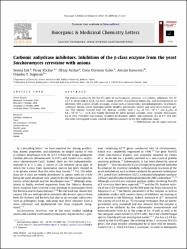Carbonic anhydrase inhibitors. Inhibition of the beta-class enzyme from the yeast Saccharomyces cerevisiae with anions

Göster/
Erişim
info:eu-repo/semantics/openAccessTarih
2008Yazar
Işık, SemraKöçkar, Feray
Arslan, Oktay
Güler, Özen Özensoy
Innocenti, Alessio
Supuran, Claudiu T.
Üst veri
Tüm öğe kaydını gösterÖzet
The protein encoded by the Nce103 gene of Saccharomyces cerevisiae, a beta-carbonic anhydrase (CA, EC 4.2.1.1) designated as scCA, has been cloned, purified, characterized kinetically, and investigated for its inhibition with a series simple, inorganic anions such as halogenides, pseudohalogenides, bicarbonate, carbonate, nitrate, nitrite, hydrogen sulfide, bisulfite, perchlorate, sulfate, and some of its isosteric species. The enzyme showed high CO(2) hydrase activity, with a k(cat) of 9.4 x 10(5) s (1) and k(cat)/K(m) of 9.8 x 10(7) M (1) s (1). scCA was weakly inhibited by metal poisons (cyanide, azide, cyanate, thiocyanate, K(I)s of 16.8-55.6 mM) and strongly inhibited by bromide, iodide, and sulfamide (K(I)s of 8.7-10.8 mu M). The other investigated anions showed inhibition constants in the low millimolar range.

















